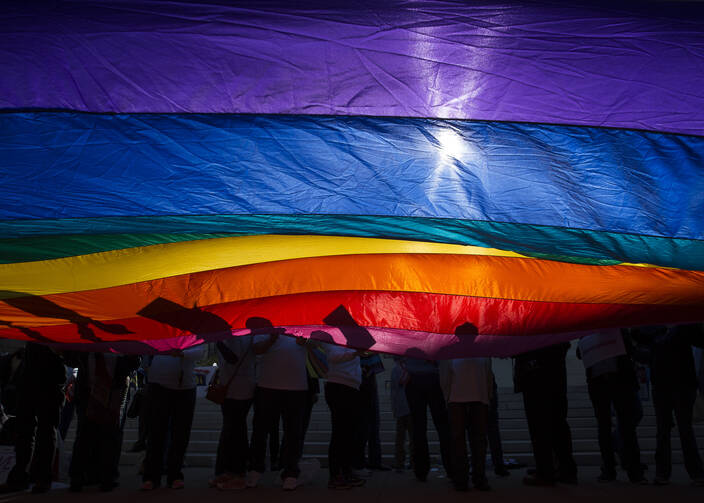Court-watchers and constitutional-law experts almost unanimously expected that the justices would do what they did in Obergefell v. Hodges. The result is not a surprise, nor is the fact that the author of the opinion for the five-justice majority was Justice Kennedy. His opinion in today’s case confirms and solidifies his legacy with respect to the Constitution and sexual-orientation controversies and it represents the “next step”—and, again, the expected one—in a line of other Kennedy opinions going back to (at least) 1996.
As Chief Justice Roberts graciously noted in his dissent, the result of today’s decision is, for many, a cause for celebration and great happiness. It should also, though—for everyone, whether or not they welcome the result—at the very least prompt questions about the role of the Supreme Court in pushing social change and invalidating the longstanding policy choices made by elected and accountable officials. To be sure, it is sometimes the task of judges in our system to protect vulnerable rights from invasion or neglect by the majority. It is no less important, though, that judges not substitute their own preferences for the rights that are enshrined, and the limits on government that are set down, in our written Constitution.
Today’s ruling raises many questions, and not only about the “next steps” with respect to marriage-related rules and nondiscrimination laws. For example, the reasoning in Justice Kennedy’s opinion is in significant tension with the opinion—which Justice Kennedy joined—in the Court’s 1997 decision that upheld the right of governments to outlaw physician-assisted suicide. In that case, Washington v. Glucksberg, Chief Justice Rehnquist had insisted that a “liberty interest” had to be deeply rooted in our country’s history and traditions before it could be treated as the kind of “fundamental right” that is protected against state regulation. The asserted right to doctor-assisted suicide did not, the Court concluded, have that kind of pedigree. In Obergefell, however, Justice Kennedy did not follow Rehnquist’s example in allowing history and tradition to constrain judicial power. And, as the pressure in some states to embrace physician-assisted suicide increases—in the name of “dignity” and “compassion”—it is not clear that the Court’s wise refusal in Glucksberg to constitutionalize a right to that practice will stand.
In addition, as many commentators—and also the dissenting Justices—have noted, the ruling and reasoning in Obergefell will have implications for the religious freedom of individuals and institutions alike. As Chief Justice Roberts wrote:
. . . The majority graciously suggests that religious believers may continue to “advocate” and “teach” their views of marriage. . . . The First Amendment guarantees, however, the freedom to “exercise” religion. Ominously, that is not a word the majority uses.
Hard questions arise when people of faith exercise religion in ways that may be seen to conflict with the new right to same-sex marriage—when, for example, a religious college provides married student housing only to opposite-sex married couples, or a religious adoption agency declines to place children with same-sex married couples. Indeed, the Solicitor General candidly acknowledged that the tax exemptions of some religious institutions would be in question if they opposed same-sex marriage. There is little doubt that these and similar questions will soon be before this Court. Unfortunately, people of faith can take no comfort in the treatment they receive from the majority today.
The Chief Justice is correct: These “hard questions” will arise. Indeed, in many places (consider, for example, the recent controversies regarding religious-liberty proposals in Arizona and Indiana) they already have. If, as Justice Kennedy asserted in his opinion for the majority, limiting civil marriage to male-female couples demeans and insults gays and lesbians, then it is not clear why a legislature will, or even should, generously accommodate religious beliefs and practices that depart from the moral commitments and premises underlying today’s decision.
It has often been said that there is no conflict between religious freedom and the expansion of civil marriage to include same-sex couples because, first, no church or minister will be required to perform or recognize as religiously valid a same-sex marriage and, second, religious people (and everyone else) remain free to believe that marriage really is, and should be recognized in law as being, between a man and a woman. However, meaningful religious liberty is about more than the freedom of private belief or the ability of communities to worship as they please. Going forward, it will be a serious and difficult question whether, or to what extent, religious institutions will be able to cooperate with the government in providing social services, or benefit from programs that enhance educational opportunity (vouchers, tax-credit programs, etc.), or receive research grants and other generally available funds unless they agree not to discriminate in hiring and other practices against same-sex couples.
It’s been said that the “Supreme Court follows election returns” and it is true that while today’s opinion invalidates the longstanding laws of most states it also embraces a strong trend in public opinion and in popular culture. Again, the “hard questions” that the Chief Justice mentioned had already been posed and they would have continued to arise even if the Court had come out the other way. It remains to be seen how Justice Kennedy’s opinion shapes the answers to those questions.
Richard W. Garnett is the Paul J. Schierl / Fort Howard Corporation Professor of Law at the University of Notre Dame








